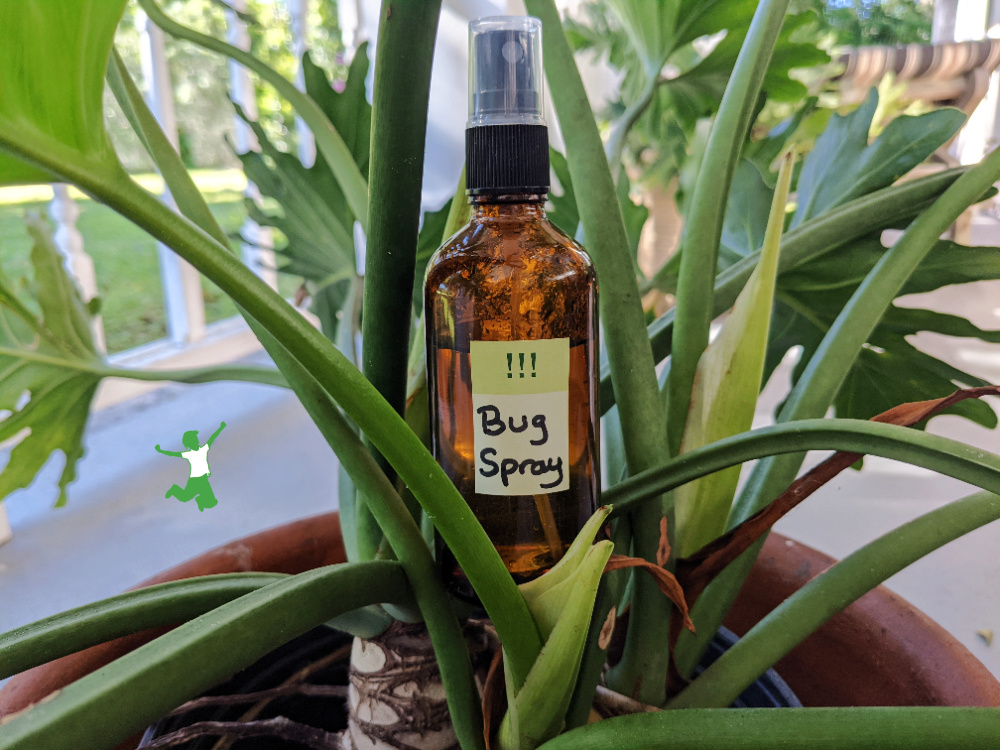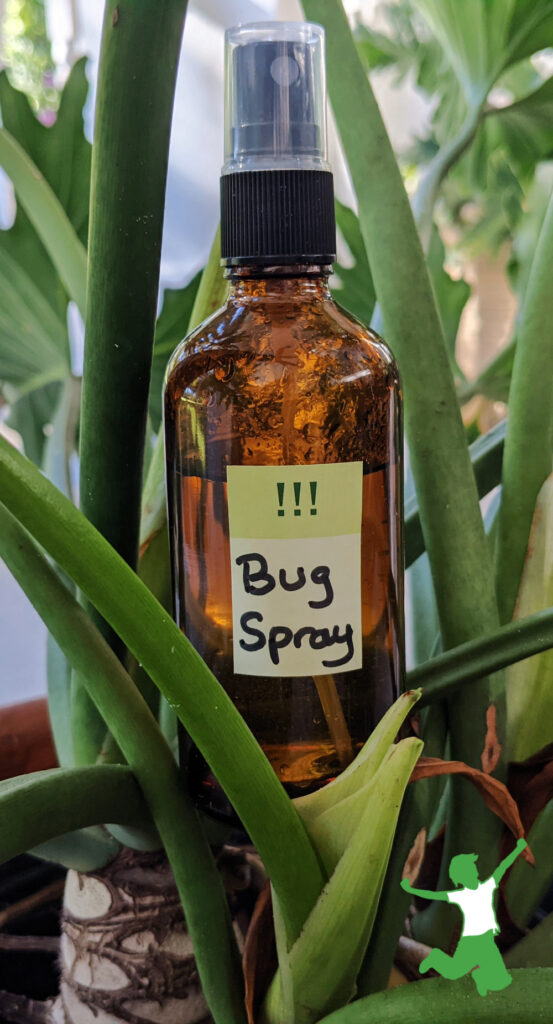Table of Contents[Hide][Show]
How to make a safe insect repellent spray yourself at home that lab results demonstrate 100% effectiveness for at least one hour. Repels both mosquitoes and ticks.

I’ve tried a lot of natural herbal insect repellent sprays, creams, and other products over the years.
The best one…by far…that I ever used was the canelle spray from Cinnamon Hill.
I wrote about this canelle spray in my Favorite Things List from 2019.
This fabulous product works just as well as the commercial brands that use DEET or other neurotoxic chemicals (that you never, EVER want to put on your skin).
It not only works, but it also smells divine. Many other herbal bug repellent sprays have a rather off-putting smell in my opinion.
Unfortunately, shipping and regulatory issues since 2020 have forced Cinnamon Hill to only offer this product locally in Sri Lanka, where their standard gold cinnamon is grown and harvested.
When I recently ran out of canelle spray, I reached out to the owner of Cinnamon Hill to see if he might have a few bottles to send me.
Unfortunately, there are no more available for shipping internationally.
How to Make Bug Repellent That Truly Works
The good news is that Rupert of Cinnamon Hill did share how to make his fabulous canelle spray yourself at home!
He also generously told me that it was fine to share his method so all of us can benefit from this tremendously effective bug repellent formulation.
If you really don’t want to make insect repellent yourself (best method), then I recommend this herbal repellent spray as the next best thing now that the canelle spray is no longer available.
Equipment
Good quality spray bottles are the only equipment you need to make your own bug repellent.
I prefer small ones that are easy to stash in the car or a small bag.
These are the bottles I use that include two extra replacement sprayers.
Ingredients
The active ingredient of the most effective herbal bug repellent spray you can make yourself is Gold Top cinnamon essential oil. It is manufactured by Cinnamon Hill.
Please ONLY use the specially distilled cinnamon oil manufactured by Cinnamon Hill to make this recipe. It uses a special distillation process that results in an essential oil with a lower density that mixes with water better and is mild on the skin when diluted properly.
This specially distilled cinnamon oil is most effective as a bug repellent.
This is the only herbal company that offers this uniquely extracted cinnamon oil in the United States.
Other brands will risk skin burning (the oils are too dense and do not mix well with water) and will not be as effective anyway.
Lab Testing
This is the same oil Cinnamon Hill uses to make their canelle spray and used to sell on their website. They still sell it but now only in Sri Lanka due to new regulatory issues.
The formulation was tested in London-based labs for efficacy and safety.
The lab tests demonstrate 100% effectiveness for at least one hour on mosquitoes. The spray also repels ticks. In my neck of the woods, it also works for deer flies and no-see-ums (although the lab did not test this).
This unique Gold Top cinnamon essential oil is removed at the beginning of the distillation process. It has a lower density than the rest of the distillation, as well as a different chemical composition. This is why it makes a superior insect repellent.
It is the ONLY cinnamon essential oil that is tested as appropriate for bug spray.
Again, ONLY use this brand of cinnamon oil if you want to make this DIY bug spray recipe.
Dilution Instructions
Once you have your spray bottles and your Gold Top Cinnamon Essential Oil, you are ready for the simple process of making your insect repellent.
To make, dilute the Gold Top cinnamon oil (NO OTHER BRAND) at a ratio of 15 parts oil to 80 parts water.
I measured out 80 drops repeatedly with a standard eyedropper. This measures out to be exactly one standard US teaspoon.
Thus, the way I make the spray is to carefully drizzle 10 teaspoons of filtered water in a 2 or 4-ounce spray bottle. Then, add 150 drops of the Gold Top cinnamon oil to the bottle. This equals 15 drops of oil per teaspoon of water.
This combination makes just less than a quarter cup of spray.
It is the perfect amount for a 2-ounce bottle (slightly less than full to leave a gap of air for easy spraying).
Contraindication
As mentioned above, do not use any other brand of cinnamon oil else you risk burning the skin.
Cinnamon Hill is the only manufacturer that offers this lower-density oil which has a different chemical composition that is not burning.
How to Use
It is important to give the bottle a brief and gentle shake to re-mix the ingredients before each application.
Use small spritzes of this DIY insect repellent as needed.
If you are sensitive to cinnamon in general, test the spray on a small area of skin first or use it on clothing only.
I have even spritzed a bit on my hair in the past to keep bugs from buzzing around my head.
It smells so lovely and is so very effective, that I think you will be delighted!
It works not only for mosquitos but also ticks and other annoying insects in my area. Rupert at Cinnamon Hill tells me that it even will repel (land) leeches!
It is great to take on camping trips or hikes outdoors.









Checking in to see if there are any updates or follow-up information on the cinnamon oil for bug repellant. Thank you!
No sources for the specially distilled cinnamon oil unfortunately. I recommend making this new recipe that is extremely effective using the leaves of the Beauty Berry bush. https://www.thehealthyhomeeconomist.com/american-beautyberry-bug-spray/
I cannot find the brand of cinnamon oil you mentioned. I did come across this https://www.getnaturalessentialoils.com/product/cinnamon-leaf-essential-oil-srilanka/
Can you please tell me if this will work? It’s from Sri Lanka as well. Maybe branded differently to sell? I don’t know. I appreciate your help.
They do not make the specially distilled cinnamon oil anymore in North America. I don’t know if this is the same thing. I doubt it as it doesn’t say anything about a special distillation as described in the post. I would be wary of using it as regular cinnamon essential oil is incredibly burning.
Thanks so much for sharing your experience! I’ve been tormented by Mosquitoes every year. I can barely enjoy being outside, which is where I usually want to be. I’m excited to try your tip of using a b-complex. Thanks again!
Can the oil be bought in the UK then? I have relatives in the UK. Thanks in advance for your time!
Rupert tells me the only place the oil is currently sold is where it is grown in Asia (due to shipping issues).
I used this all season in Florida, worked like a dream. Tried to order more oil and the company is no longer in business. Can you recommend another company to purchase the cinnamon oil from plz??
(I utilize so many of your recipes, thank you)
There is no other source at this time for this specially distilled cinnamon oil, unfortunately.
I stocked up when I saw they were doing a close-out sale. Hopefully, I have enough until another company starts producing it again.
I will let everyone know as soon as I find out about it. I know the owner in the UK who was supplying the US company, so hopefully I will know something soon.
the links aren’t working anymore. are they still open? the website just gets the 404 message now.
The company is no longer selling it unfortunately 🙁
Sorry, I meant “Gold top” could we use the iguana oil to make a similar recipe for spray for the house I wonder? We don’t like the chemicals at apartments so we look for natural homemade ones where we can find the spiders are immune to almost everything around here.
Does it work on tick prevention?
I found a natural one at a farmer’s market in Florida called Iguana Oil. It works well too.
Yes it does!
How long will this spray be good for?
It never goes bad.
I used to be eaten alive by mosquitoes & yellow flies until I did a MTHFR test and started taking a methyl B-Complex vitamin and may get bit once or twice a year now compared to hundreds of times just going outside in the early am and late pm. This spray would have been a blessing before I started taking the vitamin but will pass it on to my friends & family.